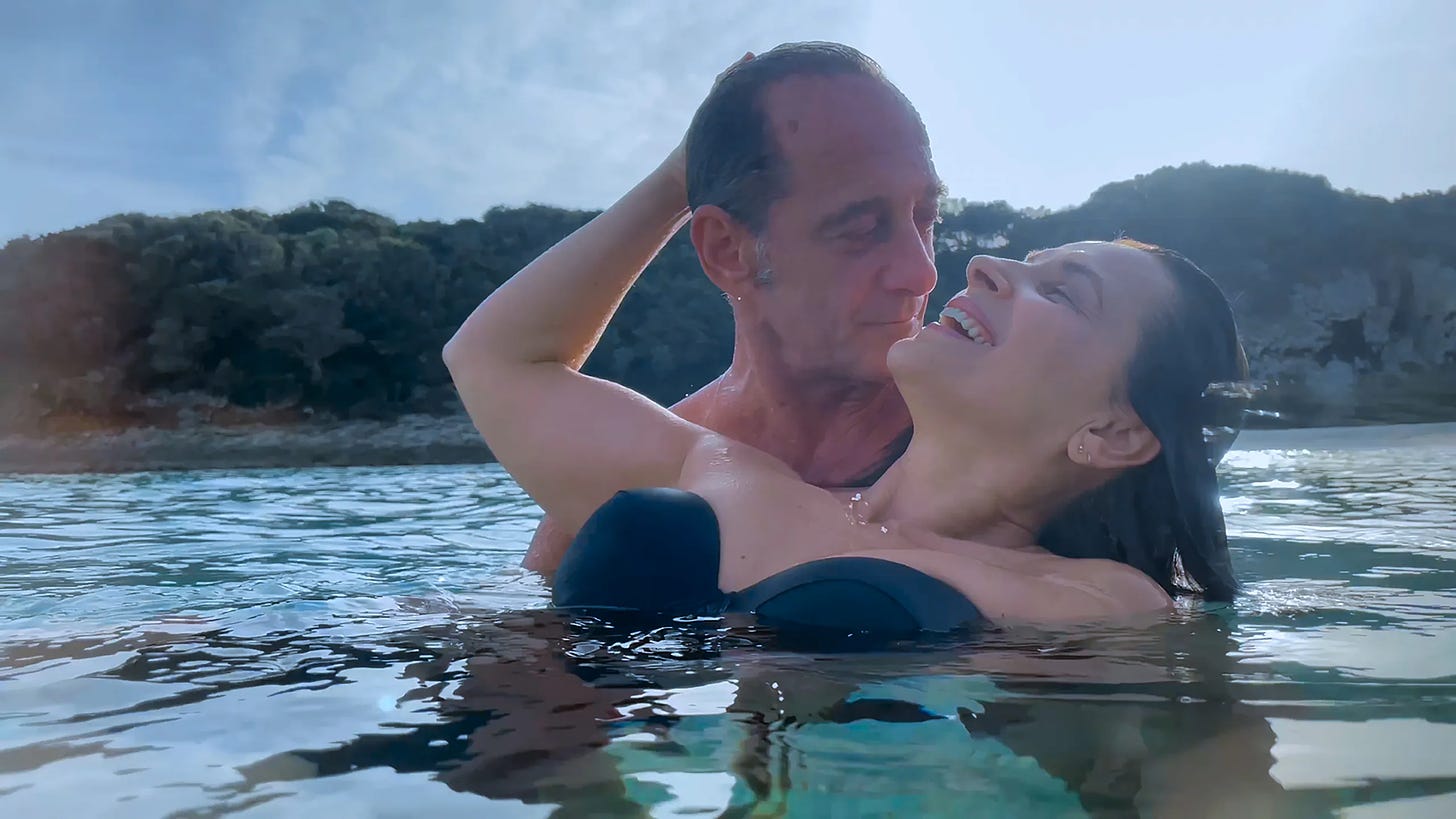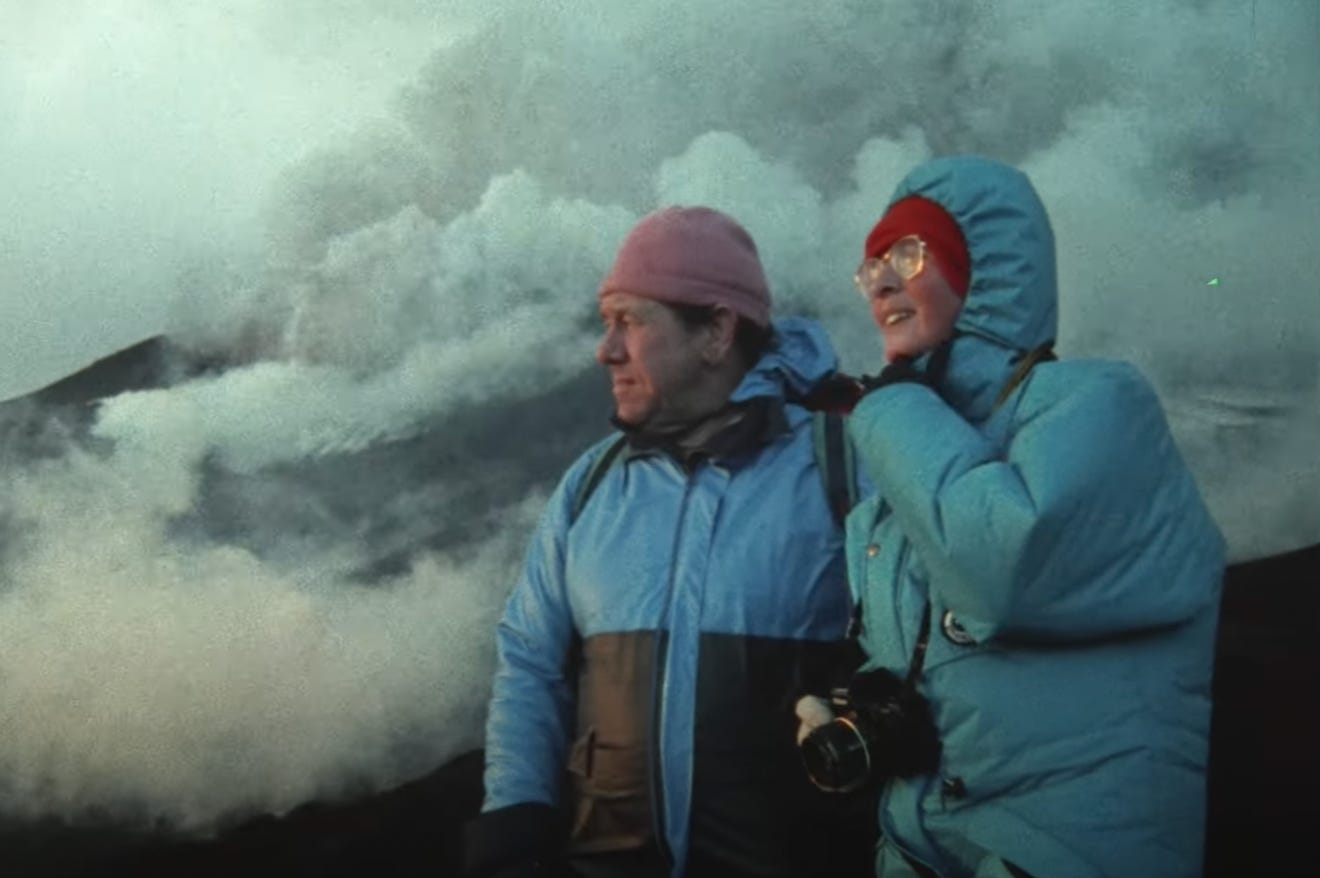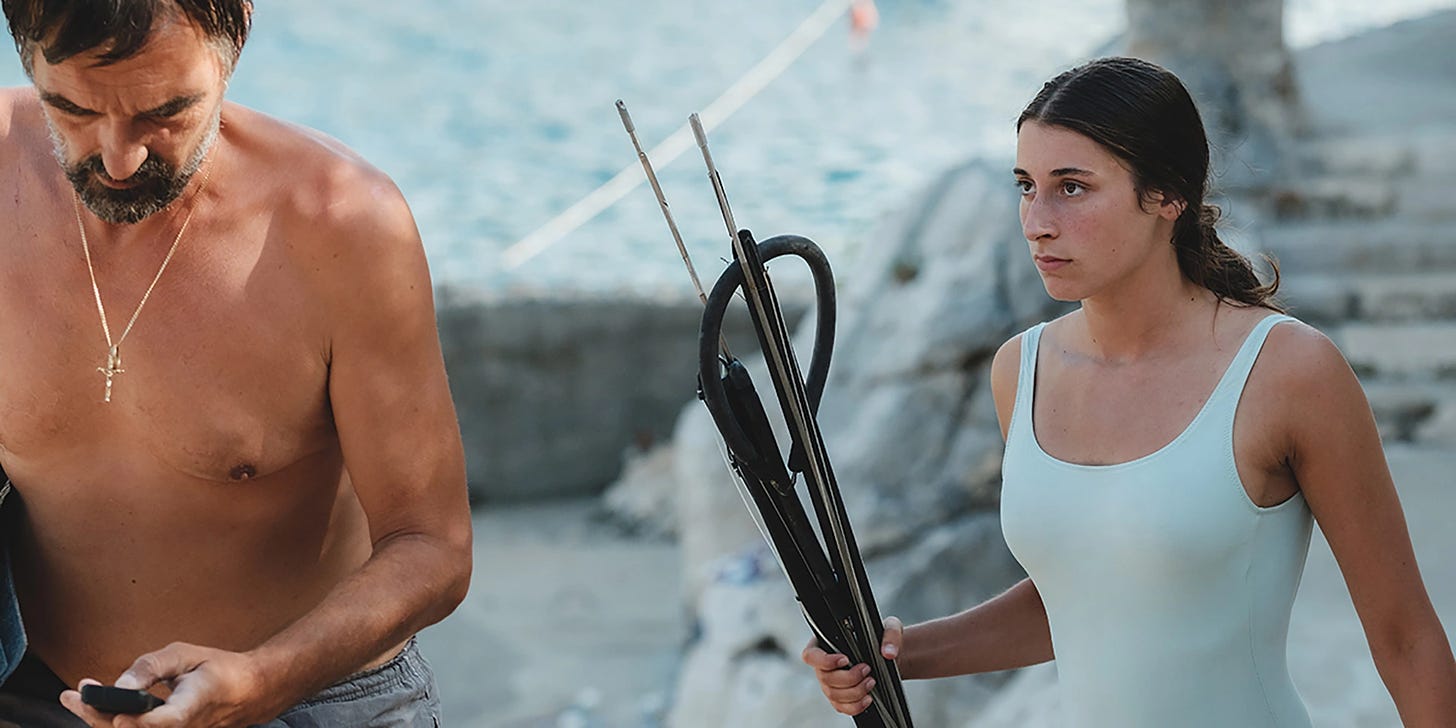In Review: 'Both Sides of the Blade,' 'Fire of Love,' and 'Murina'
Passion animates three recommended films this week, including a Claire Denis love triangle, a Sundance hit about married volcanologists, and a Croatian Camera D'Or winner.
Both Sides of the Blade
Dir. Claire Denis
116 min.
The new Claire Denis film opens in paradise as only she can shoot it, with a middle-aged couple entwined in shimmering, sun-kissed waters, looking as carefree and into each other as partners half their age. Only the rumbling of the soundtrack, at war with the gentle lapping of the ocean, suggests the trouble that lies ahead. But it’s important for Denis to emphasize that Sara (Juliette Binoche) and Jean (Vincent Lindon) are not languishing in a sexless marriage before a third party from their past, François (Grégoire Colin), threatens to drive a wedge between them. Passion is the prevailing emotion here, untempered by time or any assumption that the emotional stakes of a relationship get lower as youth yields to experience.
Both Sides of the Blade is Denis’ third straight collaboration with Binoche, following the 2017 relationship drama Let the Sunshine In and the 2018 English-language sci-fi curio High Life, and all three films have emphasized Binoche’s robust sexuality but also its down-to-earth tactility, too. Anyone who has seen her 1999 masterpiece Beau Travail can testify to Denis’ fascination with the landscape of the human body, though Binoche and Lindon are not twenty-something soldiers posing on the beaches of Djibouti but Parisian professionals whose lovemaking is considerably less elegant yet nonetheless thoroughly engaged. Sara and Jean have something to lose, in other words. For them, the threat of adultery is not a manifestation of a loveless union.
The Reveal is a reader-supported newsletter dedicated to bringing you great essays, reviews and conversation about movies (and a little TV). While both free and paid subscriptions are available, please consider a paid subscription to support our long-term sustainability.
En route to her day job as a radio host, Sara catches a glimpse of her ex-boyfriend François on the street, unsettling her a bit. When Jean, an ex-rugby player with a criminal record, happens to get a call from François about working as a rugby scout for his new sports agency, Jean jumps at the chance to get back into the game, but opens his marriage up to trouble. As Sara candidly warns, “When you love someone, it never really goes away.” It’s not hard to see where this is headed, as Sara and François reconnect and the sparks fly, but how these characters hurt each other is surprising and gratifyingly human, a collision between flawed people whose impulses sometimes overwhelm their virtue.
Among Denis’ films, Both Sides of the Blade cuts closest to Let the Sunshine and perhaps Friday Night, as it’s not as elliptical as her work can get, and it’s strongly attuned to the desires of older women. In fact, the film gets sidetracked whenever it shifts focus to the men, particularly Jean, whose relationship with his mixed-race teenage son plays like scenes from another, more conventional work. Yet Denis’ approach to this love triangle is thrillingly convulsive, especially for a filmmaker known for alluding to emotion rather than expressing it in such direct terms. There’s plenty of Denis poetry and ambience in Both Sides of the Blade, but there’s red-in-the-face screaming, too, brought about by the unresolvable ache of loving two people at the same time. — Scott Tobias
Both Sides of the Blade opens in limited release tomorrow.
Fire of Love
Dir. Sara Dosa
93 min.
It’s possible you’ll finish Fire of Love, a documentary about volcanologists Katia and Maurice Krafft, knowing less about volcanoes than when you began, but that’s not really a problem. Born in Alsace in the 1940s, the Kraffts came of age in the turbulent ’60s, met at college, discovered they shared a lifelong obsession with volcanoes, and spent the rest of their lives traveling from one active volcano to the next, filming and photographing what they saw (often from an unsafe distance). But the substance of the Kraffts’ studies remain largely outside the frame of Sara Dosa’s film, a lyrical, alternately twee and tragic account of their lives and premature deaths.
“Premature” might not be the right word, however. Largely constructed from footage from the Kraffts’ archives—with some talk show appearances and short animated interruptions—Fire of Love is filled with moments in which both Kraffts speak of accepting they’ll die doing what they love, which they ultimately did in 1991. They lived, in Maurice’s words, “a kamikaze existence in the beauty of exploding things.” The film treats this as both romantic and noble and makes a persuasive case on both fronts. We see them living as they believe they were born to live and learn how, in their push to educate governments about the urgency of evacuation, they saved lives.
They also presumably pushed the study of volcanoes forward, though the film’s a bit vague on how. The narration, provided by a slightly parched-sounding Miranda July, mixes facts with cutesy, opaque statements like “an infant volcano is throwing a fit.” But the awe-inspiring beauty of the footage itself makes any frustration fleeting. The Kraffts captured images impossible for filmmakers more concerned with their own safety. The floods of red lava flowing across black soil and plumes of smoke filling the sky can appear at times more like abstract art than nature footage, and it looks like justification enough for their kamikaze-level risk-taking, even if they had learned nothing from it. Those watching Fire of Love certainly don’t. —Keith Phipps
Fire of Love is now played in limited release.
In brief: Last year’s Camera D’Or winner for Best First Feature at Cannes, the stunning Croatian film Murina starts in paradise, too, but paradise starts to look much different when you can never leave. On a remote island off the Adriatic coast, Julija (Gracija Filipović), a strikingly pretty 17-year-old, wriggles uncomfortably under the control of her father Ante (Leon Lučev), a sailor and spear-fisherman who’s preparing to host Javier (Cliff Curtis), an exceedingly wealthy friend that he wants to rope into a land deal. When the handsome and cosmopolitan Javier arrives, it not only rouses Julija’s interest, but that of her mother Nela (Danica Curcic), too, leading both to consider the temptation of a better, freer life off the island.
Murina has an erotic charge similar to The Postman Always Rings Twice, the classic noir about a torrid affair between a charismatic outsider and the younger wife of a domineering man. Yet the enormous class difference between Javier and his hosts plays an important role here, as does the addition of a daughter whose own attraction to him represents a late, fraught coming-of-age. Julija lives in a setting that director Antoneta Alamat Kusijanović, working with ace cinematographer Hélène Louvart (The Lost Daughter), emphasizes as an exotic destination for men like Javier, a secluded bit of coastline for boating and relaxing on a seaside terrace. But the family that lives here are not tourists, and for the women especially, Kusijanović makes the idyllic cove seem like Alcatraz. — Scott Tobias
Murina opens in New York City tomorrow and expands from there.











There's a rating missing for the last one.